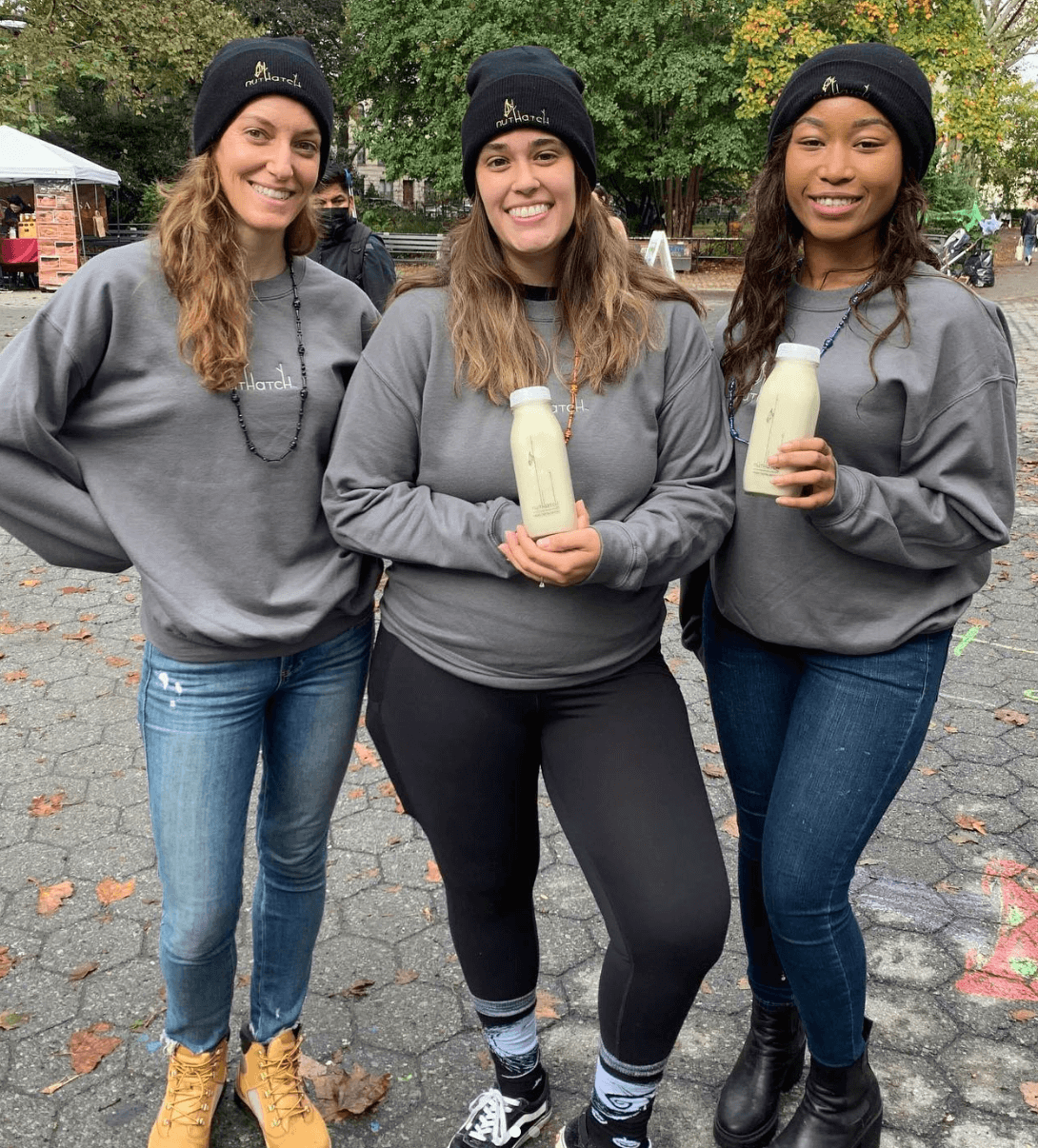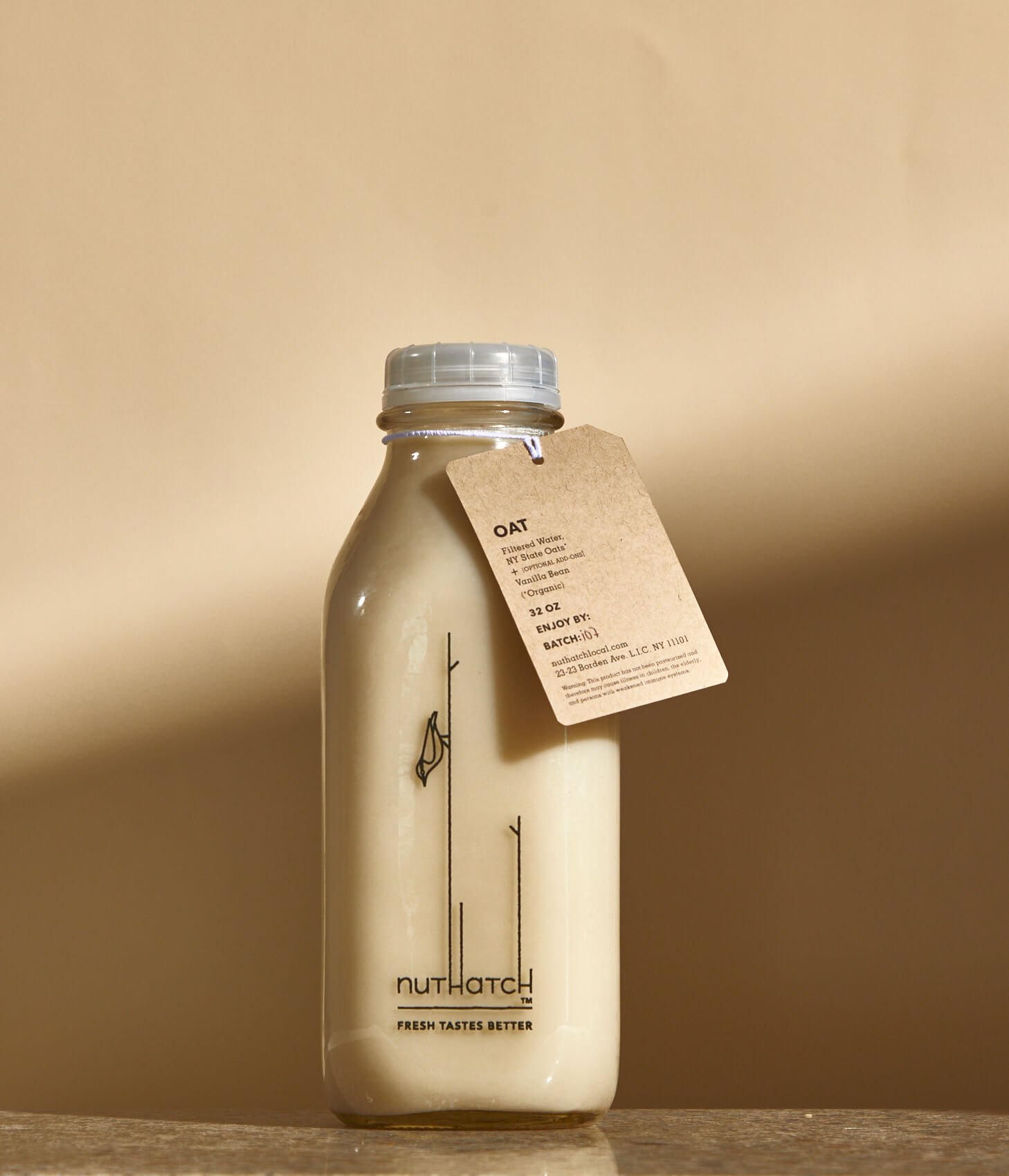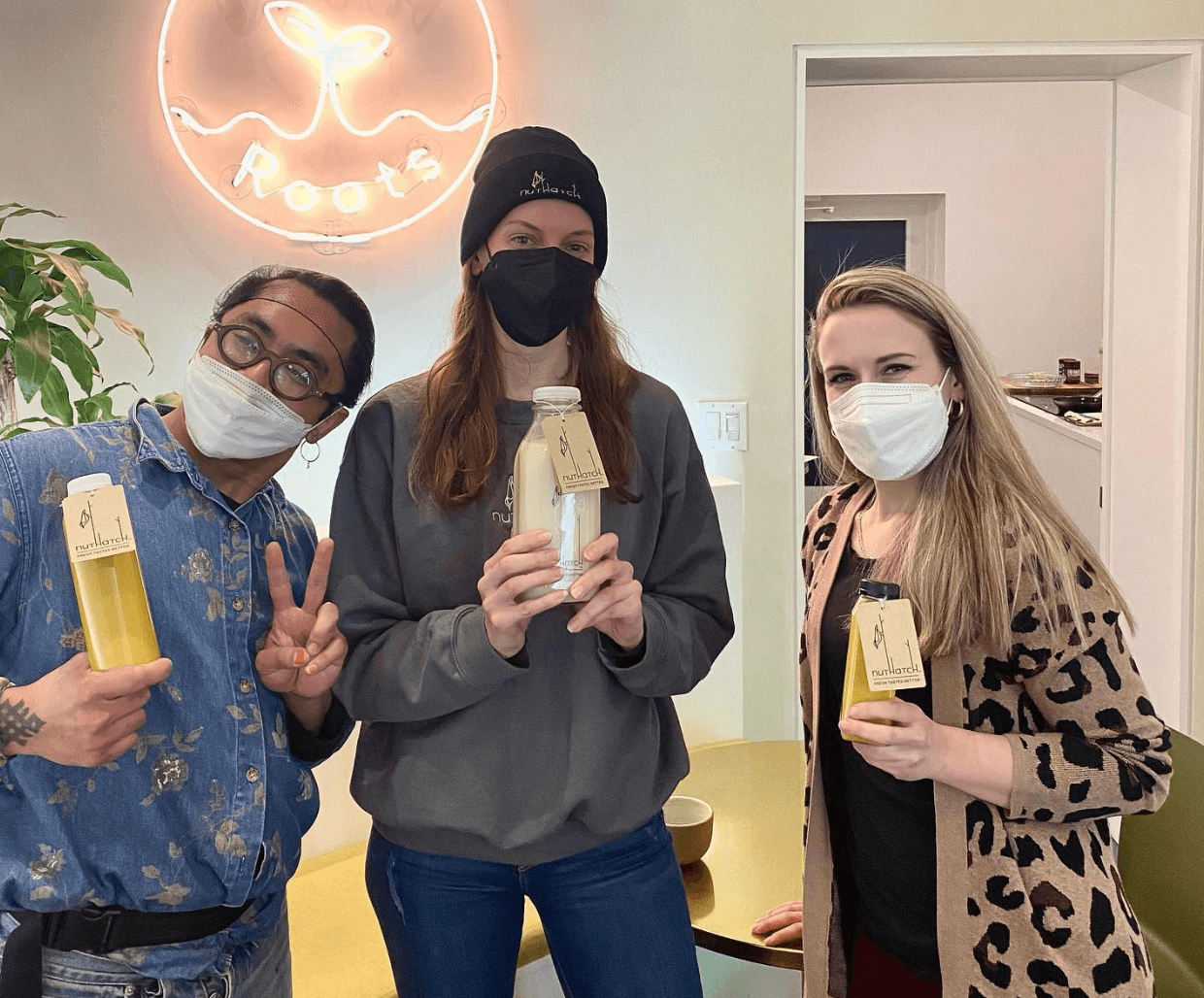Have you ever tasted milk straight out of the cow?
Remember how fresh, creamy and sweet it was?
Yea, that’s not what this article is about, because we’re covering a plant-based milk brand.
If you’ve tried almond milk, cashew milk, oat milk, or pea milk (yep, that’s right, they’re milking peas now!) from a Tetra Pak carton in your local grocery store, you might have been disappointed by the flavor.
It’s not because there’s anything wrong with plant milk as a concept; it’s because the mass-produced products sold in stores are not usually fresh.
Sisters Carolyn James and Susan Piñeres wanted to drink something fresher and, therefore, more nutritious and tastier.
That’s why they started Nuthatch, one of the most unique plant-based milk brands on the market.
We had the chance to sit down with them and learn the secrets of Nuthatch, what makes them unique, and how they overcame seemingly insurmountable obstacles.

The Hatching of an Idea
Raised by an RN with the mantra “food is medicine,” James and Piñeres shared a passion for nutrition and healthy, minimally processed food from an early age.
As they got into their teenage years, their stomachs no longer tolerated cow milk very well, so they began drinking boxed almond milk…until they started making almond milk at home.
They were blown away by the difference in taste, which inspired them to learn how to make a whole range of nut and seed milk themselves.
We were drinking and buying boxed almond milk like everyone else, and we asked the questions, how is this stuff made, and can we do it ourselves? We researched making almond milk at home, and when we made it, we just couldn't believe the difference in taste. It was like fresh squeezed orange juice compared to the boxed stuff. From there, we started making all different kinds of nut and seed milk and got the idea to turn it into a business.
They started off selling their creations to supportive friends, family members, and neighbors.
But now their business has grown into a city-wide operation that makes and delivers fresh plant milk to the doorsteps of customers all over Brooklyn, Queens, and Manhattan.
What’s A Nuthatch?
NOO-thach?
Nuth-ACH?
How do you even pronounce that?
It’s ‘nut-hatch.’ And yes, it’s a real word.
Nuthatches are our cute, chirpy neighbors in the forests around New York. And like the folks making plant milks at Nuthatch, this bird loves to eat nuts and seeds.
It’s also extremely picky about what it eats–just like James and Piñeres, who adhere to a rigorous set of quality control standards that includes sourcing local whenever possible.
For example, their oat milks and blends (some of their most in-demand offerings) are made with oats grown nearby, right in New York state.

How Is It Made?
Nuthatch’s plant milks are made to order, which allows them to maintain the quality of homemade plant milk.
We make it the way you would make almond milk or another nut/seed milk at home; we just do it on a bit larger scale.
Plant milk raw materials (such as nuts and oats) are soaked, rinsed, and blended with water. Next, they’re cold-pressed and delivered very soon after they’re ready.
@nuthatchnyc How we make our almond milk - blend, press, and upcycle #almondmilk ♬ original sound - Nuthatch
Staying on top of deliveries as a small business distributing a perishable product is no joke—in fact, it’s the toughest part of the job, especially in a fast-paced world that expects near-instant and free delivery.
Although getting fresh nut milk into the customer’s hand or fridge in the perfect cold condition is expensive and logistically challenging, Nuthatch is committed to rising to the challenge every time because freshness is a central part of their ethos.
When food or drink is fresh, it’s not only more delicious but also more nutritious, and plant milk is no exception.
Horchata Almond Milk?
The list of plant-based milk companies seems to get longer by the day. The increased competition means brands like Nuthatch need to find creative ways to stand out.
One way Nuthatch differentiates itself is its wide array of options.
In the grocery store, among the most unique and exotic plant milks you can find are pea milk, cashew milk, and flax milk. And those are great!
However, Nuthatch takes creativity a step further.
They make all the classics, but they also have options like Oat Chai Latte, Horchata Reishi Almond, Golden Turmeric Oat, and mixes like Walnut Flax as well as a popular signature blend with almonds, cashews, and pumpkin seeds.
Additionally, Nuthatch focuses on using clean ingredients.
The plant-based milk industry is very crowded. It seems there is a new company every day. However, very few companies focus on fresh plant milk made with simple ingredients. Many of the milks being launched today are highly processed and contain oils, binders, fillers, preservatives, etc. Our milks are made with simple ingredients: water and nuts, water and grains.
Milk Tastes Better In Glass
Another key difference you'll notice between milk from Nuthatch and what you'll find in the grocery store is the packaging.
Nuthatch uses glass bottles instead of plastic or Tetra Pak.
Although plastic and Tetra Pak packaging are safe by FDA standards, chemicals from these materials can leach out into liquids. When this happens, it isn’t only harmful to health; it can alter the taste.
Do an experiment: Try fresh plant milk from a glass bottle and plant milk from a plastic bottle or Tetra Pak carton.
Which one tastes better?
We already know the answer, and there’s a scientific reason why milk tastes better in a glass. Glass is more inert than other packaging materials and isn’t permeable.
In other words, there’s no way for the contents of the glass to leach out into whatever liquid is stored in the glass.
Therefore, you get only the taste of the milk with no harmful or unsavory chemicals included. James and Piñeres figured this out early on and reacted accordingly, packaging all their milk in glass.

Sustainability Centered
The sisters behind Nuthatch were already passionate about composting and other sustainable living practices before launching their business, so sustainability was an obvious and central part of Nuthatch’s vision from the get-go.
However, they promptly realized there’s more to sustainability than using local raw materials–especially when it comes to waste.
Not generating waste as individuals is different from when you’re producing food and buying packaging at scale. They discovered “very quickly how much waste is generated in the food industry,” and they explained their strong convictions on sustainability to us:
We wanted to make sure we could be as mindful as possible about the waste we generate - particularly packaging and food waste. That is why we use and reuse glass bottles and focus on being a zero food waste producer. Zero food waste means processing almond meal into flour and butter and not holding any inventory of milk - everything is fresh and made to order, so there is no spoilage.
So just like their bird namesake, Nuthatch goes to great lengths not to waste one bit of anything fit for human consumption.
Typically, nut milks leave behind pulp as a byproduct of the process, which posed a bit of a problem for James and Piñeres’ zero-waste convictions.
After some creativity and experimenting in the kitchen, they figured out how to upcycle their waste products into other products, like nut butters and flours.
@nuthatchnyc nothing in our Nuthatch kitchen is wasted. #shopsmall #ForzaHorizon5GO #nuthatchnyc ♬ FEEL THE GROOVE - Queens Road, Fabian Graetz
The Hard Part
As much as Nuthatch is a story of success, it’s also a story of resilience. Like many small businesses, the pandemic presented some challenges for Nuthatch.
COVID was devastating for us. We lost 60% of our revenue overnight and had to scramble to survive.
Cafes to which they used to deliver regularly had to close down, which meant canceling their subscriptions. And many of their customers also fled New York to escape the pandemic. Everything changed instantly, and the company had to adapt to survive.
Nuthatch pivoted quickly by focusing on their customers who were housebound as a result of the pandemic. They also developed new products to offer more to clients.
So, as a result of the pandemic, they began making delicious almond butter and almond flour (with cheeses and yogurts soon to follow!)
Through their efforts, they managed to survive a global pandemic as a small business in a city at the epicenter of the disaster, and we think that’s pretty damn amazing.
Resilience entails the ability to adapt to changing circumstances, especially under pressure. In moments when everything seems against you, it’s normal to cry and feel down. But during those challenging times, remember Nuthatch’s story and ask yourself what resilience would look like for you.
